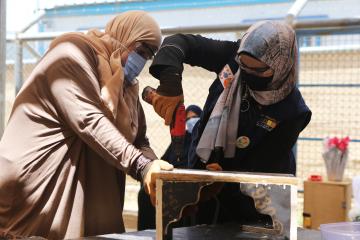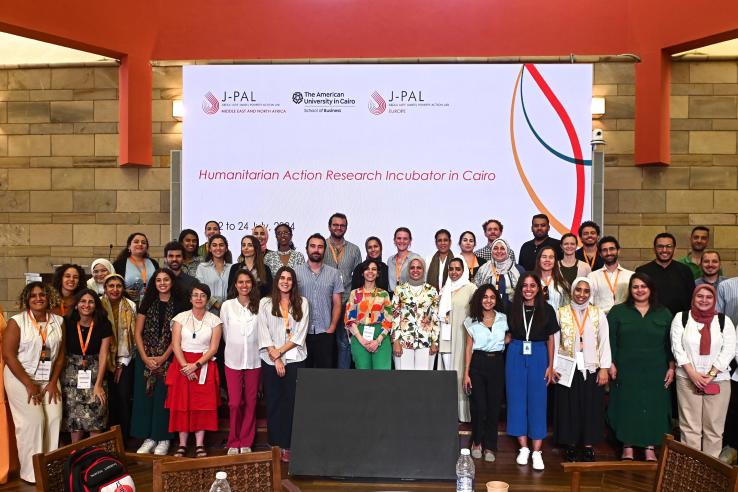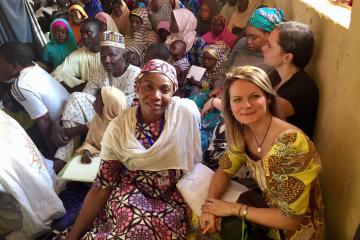
Driving evidence-based humanitarian action and displacement response in MENA

Displacement worldwide has reached unprecedented levels, with over 117 million people at the end of 2023, 16.4 million of whom are hosted in or displaced from the Middle East and North Africa (MENA). The main driver of displacement, including internally displaced persons (IDP), refugees, asylum seekers, and returnees, is conflict, followed by natural disasters, some of which are climate change-induced. The political unrest in the MENA region and ongoing conflicts have designated the region as having the second highest concentration of displacement, following the sub-Saharan Africa region.
While conflict settings may dominate the narrative of humanitarian action, host communities and countries offer another perspective, where they experience different sets of challenges as they handle the long-term impacts of displacement. In MENA, most refugees are hosted in low- and middle-income countries: Turkey, Sudan, Lebanon, Jordan, and Egypt are the top refugee-hosting countries in MENA. The pre-existing economic and political crises—combined with the sheer scale of arrivals—strain public resources in ways that exacerbate “host community fatigue.” An integrated approach to humanitarian action recognizes the needs of displaced populations in complementarity with host communities’ welfare, which can help alleviate barriers to the social and economic integration of displaced populations in MENA.
This blog post provides an overview of the evolving policy narratives in humanitarian work, emphasizing J-PAL’s initiatives to address evidence gaps. It also highlights the establishment of a dedicated portfolio at J-PAL MENA, aimed at supporting localized actions and ensuring that humanitarian efforts are informed by rigorous and contextual research.
From rapid response to sustained livelihoods
Humanitarian efforts have evolved in the last few decades in response to displacement trends and associated vulnerabilities. While immediate relief is a common response to conflict, with declining aid in the early 2000s due to prolonged conflicts, prioritizing livelihood interventions that promote long-term self-sufficiency has become imperative.
Recent funding cuts to operations in the MENA region are likely to increase the vulnerabilities of displaced people and host communities. In MENA, UNHCR received only 11% of its required funding to support refugees in 2024, which has led to significant budget cuts in several countries, in addition to other austerity measures in host communities. Nevertheless, in the past few years, there has been a more pronounced shift to improve global and localized policies to support displaced peoples, driven in part by the Global Compact on Refugees, which was established in 2018. This shift has been accompanied by a surge in efforts rooted in data-driven, evidence-based approaches, and evaluating their impacts. The need for rigorous impact evaluation is all the more pressing in contexts of limited funding, where resource allocation has to prioritize effective interventions.
Humanitarian initiatives at J-PAL
Leveraging its twenty years of expertise in randomized evaluations worldwide, J-PAL has launched two humanitarian initiatives in collaboration with Innovations for Poverty Action (IPA). These initiatives aim to establish a humanitarian action research portfolio that informs humanitarian actors of relevant impact evaluations, funds research in the humanitarian space, and facilitates research partnerships between civil society actors, governments, and researchers. The Displaced Livelihoods Initiative focuses on generating new evidence on programs that foster sustainable livelihoods for displaced and host communities. Building on an initial humanitarian learning agenda, the Humanitarian Protection Initiative focuses on generating new evidence to improve protection outcomes for people affected by conflict. Among the activities under the humanitarian initiatives supported by J-PAL is the curation of randomized evaluation design workshops, which facilitate research partnerships and help develop research projects from preliminary research questions to fully-fledged causal evaluations.

Launching the Humanitarian Action Research Portfolio at J-PAL MENA
In July 2024, J-PAL MENA co-hosted the Humanitarian Action Research Incubator in Cairo, at AUC Egypt, marking the launch of the humanitarian research portfolio in MENA. In collaboration with J-PAL Europe and IPA, this incubator workshop invited key implementing organizations to workshop impact evaluation ideas. Eight organizations operating in Egypt, Iraq, Yemen, Lebanon, and Afghanistan participated in the incubator, including UNHCR, UNICEF, Uplift Afghanistan, Save the Children, WFP, and the Egyptian Food Bank.. Over the course of three days, participants were introduced to the principles of randomized evaluations, how to evaluate their programs in ethical and statistically sound ways, and how to answer key questions through rigorous evaluation methods. This incubator is the first step of many taken by J-PAL MENA to facilitate localized research partnerships and generate evidence on displaced livelihoods and host communities relevant to Egypt and the region.
The contributions of the participating organizations, in turn, enriched the contributions of J-PAL staff and lecturers by providing hands-on perspective from their experiences in the field—often dealing with the scientific and ethical complexities that come with balancing designing an impact evaluation and handling pressing humanitarian needs. The discussions underscored the importance of collaborating with researchers to evaluate programs in humanitarian settings, and create research designs that meet programmatic obligations in ever-changing environments. This approach aims to bridge the gap between theory and practice, addressing the unique challenges encountered in humanitarian settings.
Key learning questions were explored during the incubator to support humanitarian action in the region and guide evidence generation at J-PAL MENA, including:
Can bundling interventions broaden impacts? More evidence is needed to understand the impact of complementing cash-based programs with livelihood interventions, similar to the Graduation Approach, to promote self-reliance of refugees. Respectively, participating organizations expressed interest in evaluating the impact of coordinating their programs, using a bundled approach, to promote resource efficiency and maximize impacts. Building cost-effectiveness analysis into evaluations of projects that deliver packages of complementary activities will be a key area of learning as this may help isolate the aspects that drive impact the most, and ensure informed decision.
How can livelihoods programming be designed to maximize social cohesion, in addition to economic inclusion? A growing learning area to foster resilience and self-reliance is aligning strategies that can be employed to foster a sense of belonging among displaced people, especially for returnees and host communities, with economic inclusion programming. J-PAL affiliated researchers have conducted multiple studies on social cohesion studying the model of perspective-taking for school children in Turkey and Finland, in addition to intergroup contact in Iraq, which highlight the potential to foster acceptance and improve relationships among different social groups
How can programs and services be optimally delivered where accessibility is challenging due to insecurity or violence? Food delivery mechanisms and targeting to optimize food distribution strategies for displaced people were also examined. Food security is a critical concern in crisis settings and host countries. Randomized evaluations have strengthened our general understanding of the different modalities of assistance for nutrition and food security, but more research is needed to understand the broader cross-sectoral outcomes, including educational attainment and psychological integration.
In addition, digital delivery of education, health awareness, and information on employment opportunities can improve access to essential services in conflict settings, where women's and children’s access is especially challenged. Recent evidence in Afghanistan shows preliminary evidence of the success of digital delivery. More research is needed to explore the effectiveness of such delivery in varying contexts, driven by the guiding principle of giving beneficiaries as much agency as possible in making their own economic and nutritional choices (e.g., using vouchers rather than boxes of food assistance).
Establishing a Humanitarian Action Research Portfolio for MENA
J-PAL’s humanitarian initiatives aim to generate evidence to inform policies and programs that promote sustainable livelihoods and protection outcomes. J-PAL MENA has launched its humanitarian action research portfolio building on a decade of research and policy partnerships in the region, and more than 40 completed and ongoing projects across eight sectors in seven countries in the MENA region. Anchored by J-PAL’s network of over 1000 researchers, the office can facilitate research partnerships for humanitarian actors working in the region. By identifying learning priorities and co-designing interventions with researchers, our partners can be positioned to address critical knowledge gaps and evaluate their programs facilitated by DLI’s and HPI’s research funding. The establishment of this portfolio at J-PAL MENA encourages humanitarian actors to evaluate their programs, and yield valuable insights for the MENA region to support displaced populations.
For more information on partnering with J-PAL MENA to generate and use evidence to support humanitarian action in MENA, please contact Nagla Al Khoreiby, Humanitarian Action Research Portfolio Lead at J-PAL MENA, at [email protected].
Related Content

New Humanitarian Protection Initiative will help reduce harm to people affected by conflict

Laura Costica, J-PAL '14, on applying impact evaluations in humanitarian settings


